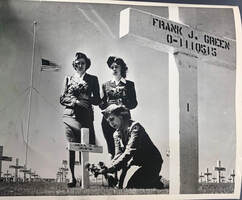|
I would love to include screenshots from the Masters of the Air official trailer of the snippet that included the interaction of a Red Cross Girl character with one of the bomber crewmen (but I'm afraid that is probably not a good idea from a intellectual property perspective!). My next thought was that I would share a photo of a Red Cross girl that is in the public domain that might convey the emotional import conveyed so poignantly in that trailer snippet. But the vast majority of the public domain Red Cross Girl images were, in essence, publicity photos -- the entire point of those photos was to convey a sense of normalcy, even a note of joie de vivre, for the folks back home. Smiling Red Cross Girls and laughing soldiers, those were the images the government photographers were directed to capture.  Photo credit: American Red Cross, photo by Atkins, held at the National Archives, Washington, DC. Photo credit: American Red Cross, photo by Atkins, held at the National Archives, Washington, DC. And the Red Cross Girls and the soldiers certainly did have fun and experience lighter moments. That was the point, that was the reason the government and the military so readily accommodated the Red Cross mission to bring comfort and cheer to the servicemen. But the Red Cross Girls could no more avoid the pain, heartbreak, and reality of war anymore than the men who fought it. This publicity photo of Red Cross Girls placing flowers on the graves at a military cemetery in France, though still a staged photograph, was the only one I could find that would give us a mood-appropriate photo for this blog. What I thought was cinematically so incredibly perfect about the snippet in the official trailer (around the 1:00 mark) is how the woman's half-flirty smile changes in an instant as the handsome airman reminds her, with such a matter-of-fact manner, that he might not live out the day, that he and many of the men she sees loading into the Jeeps with parachutes and flight gear might not return from the day's mission. "You might be the last pretty face I ever see," he reminds her. We might surmise that she is likely a new Clubmobile Girl, not yet hardened to the reality of what the airmen of the 8th Air Force faced on a daily basis. Before D-Day, each 8th Air Force crewman had at best a 25% chance of surviving to complete his tour of 25 missions (and odds didn't increase dramatically even later in the war after the P-51 Mustangs had the range to accompany the bombers deeper into enemy territory). The Red Cross Girls bore an enormous emotional burden, day after day of watching men hoist themselves into planes, knowing that a good number of them might not return. Recognizing the toll this would take on the mental health of the Clubmobile Girls, the Red Cross moved them from one base to another regularly. The image in the Masters of the Air trailer shifts from her expression of dawning recognition to a view of her silhouetted, poised on the edge of the Clubmobile, watching him and the other men load into the Jeeps to head to the flight line, which casts exactly the right historical note. It also is a scene very reminiscent of one from my novel, Courage to be Counted. Vivian, watching the flight crews readying to leave one morning after serving them coffee and doughnuts: "Watched the men, shrouded in the dawn's misty fog, as they collected their parachute packs and Mae West life vests. Watched the silhouetted figures, tall and proud, gather around their ship to hear their pilot's pre-mission pep talk. Watched those courageous men follow their pilots into a ship that might serve as coffin rather than shelter."
0 Comments
Leave a Reply. |
AuthorI'm the author of historical romances set during WWII. Archives
February 2024
Categories
All
|
 RSS Feed
RSS Feed